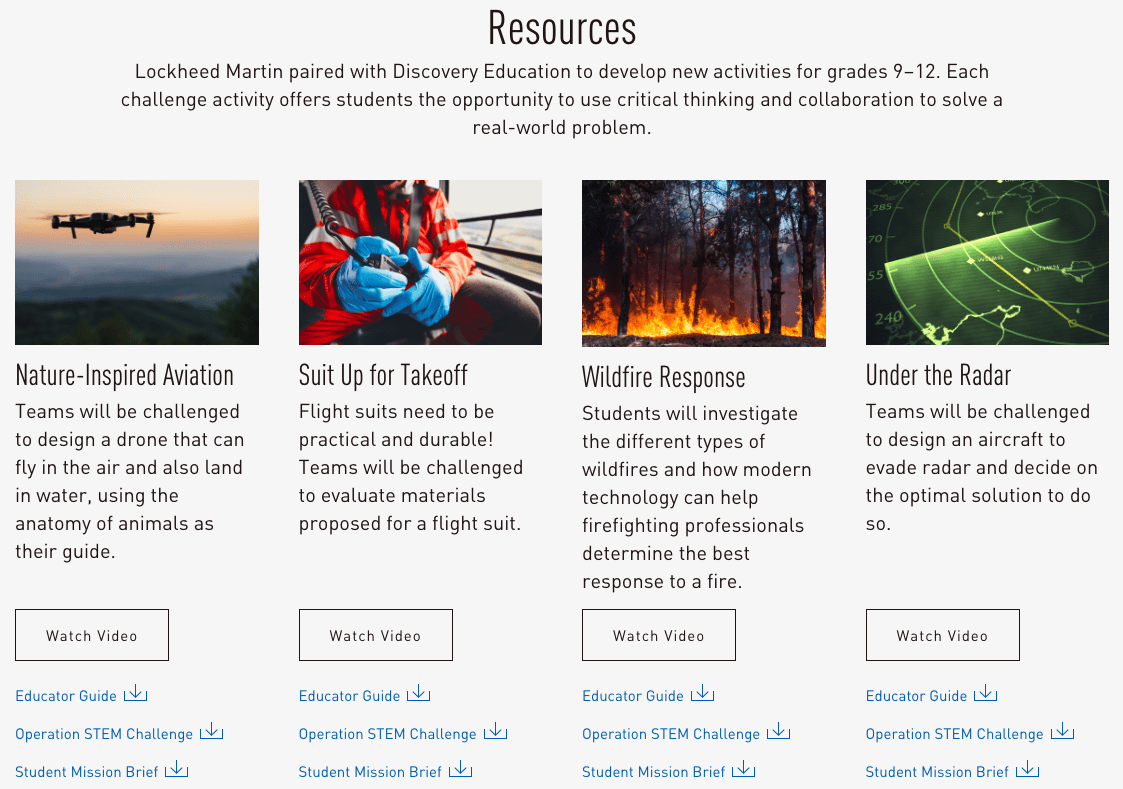
The Generation Beyond lessons available for download for use in high school curriculums. (Lockheed Martin, AVI screenshot)
Lockheed Martin’s Skunk Works advanced development division will be looking to hire 500 engineers over the next few years, and the supply simply isn’t there, according to Skunk Works head and company VP Jeff Babione.
“I don’t know that there’s an engineer we wouldn’t be adding,” Babione said in a Tuesday call. he said Skunk Works will be looking to hire “50-60 engineers per month over the next several months” from “all disciplines across the math and science fields.”
They are hard to find, though. Babione referenced a “war for talent” among defense and technology companies because the pipeline of students studying science, technology, engineering and math (STEM) is not robust enough to meet current or projected demands workforce demands.
To that end, the company is syncing up the third year of its Generation Beyond campaign, which promotes STEM education, with Skunk Works. In the past, Generation Beyond has focused on space exploration, but for the program’s third year, which coincides with Skunk Works’ 75th anniversary, Lockheed Martin is bringing the focus back to Earth.
Because engineers often say they never would have pursued the field if they hadn’t met an engineer when they were young, Lockheed gets their employees out in front of students in underserved communities, said Jennifer Mandel, manager of STEM partnerships and programs for the company. There are efforts to have Lockheed engineers in classrooms and at summer camps as well as telling their own stories on videos that can be shared with students.
“When students are deciding whether to take that next-level math course, they need that encouragement,” Mandel said.
The current Generation Beyond campaign is focused primarily on high schools, and Lockheed has created four freely available courses that can be used in the classroom, focused on collaborative group projects. The goal is to engage students in thinking about using new capabilities to solve “topical and believable” problems, like using automation to combat wildfires.

A still from the Generation Beyond lesson on using technology to fight fires. (Lockheed Martin, AVI screenshot)
While historically a lot of hiring in the defense industry has been poaching from other companies, Babione said “we’re past that. There’s just not enough engineers to go around.”
When Lockheed goes to universities, “we’re basically going with job offers in hand” for STEM students, trying to woo them to join to Lockheed Martin upon graduation, he said.
Beyond the normal competitors of Boeing and Northrop Grumman, Lockheed Martin finds itself competing with companies such as Amazon and Google as technology proliferates, because all of those companies are looking for the same skills, Babione said.
“With some technologies we’re involved in — autonomy, artificial intelligence, other big data analytics—we’re tapping into a market of engineer and scientist that has not been one traditionally,” he said. “We’re drawing on PhDs in physics and other areas we would not have normally tapped into.”
Lockheed Martin does collaborative work with competitors in the defense industry and other fields in addition to its solo efforts to combat the engineer shortage, Mandel said, because “there’s an understanding that it’s an industry issue.”
Lockheed still hopes to stand out. Since taking over as the Skunk Works head earlier this year, Babione has strived to ensure that it was a good place to work in an effort to help with recruitment and retention, he said. He wants to make sure that employees have both something interesting to work on in the advanced technologies division and that they can maintain a good work-life balance.
Lockheed is “fortunate that the brand of the Lockheed Martin Skunk Works is iconic. We are the place that you want to be in aerospace defense if you want to innovate and develop technology,” he said.
Still, many of the students Lockheed engages will end up at other companies or outside of the industry entirely. The company’s work with partners and non-profits shows that, according to Mandel. That’s okay, she said; that effort is good for the industry and the country. Besides, Skunk Works can’t hire 500 engineers if there are no engineers to hire.